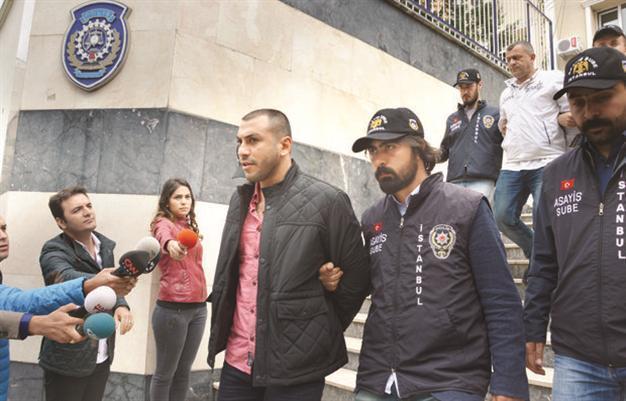AKP expels three members implicated in attack on Hürriyet journalist
ISTANBUL

AA photo
Three Justice and Development Party (AKP) members implicated in a physical attack on daily Hürriyet columnist Ahmet Hakan in Istanbul early Oct. 1 have been expelled by the party, the party’s spokesperson Ömer Çelik said Oct. 2.“We have learnt that three attackers are members of the AKP, and we decided to expel them. Such an understanding has no place in our party. The expulsion of these people, who resorted to violence, will be done rapidly. They cannot have organic ties with the AKP,” said Çelik via his Twitter account.
The two AKP members, Uğur Adıyaman and Fuat Elmas, were expelled from the party following a decision made in an emergency meeting arranged by AKP Istanbul Office Disciplinary Council on Oct. 2, daily Hürriyet reported earlier in the day. The decision came after it was revealed that Adıyaman and Elmas were among the four perpetrators who attacked Hakan, a journalist who has been repeatedly targeted by pro-government media outlets and journalists, outside his home in Istanbul’s Şişli district early Oct. 1.
Adıyaman reportedly became a member of the AKP Fatih District Bureau on Oct. 12, 2010, while Elmas joined the same AKP bureau on June 19, 2007.
Hakan was attacked outside his home in Istanbul’s Teşvikiye neighborhood by four people in a black Honda car at around 12:30 a.m. on Oct. 1 as he was returning home after hosting a program on broadcaster CNNTürk.
While one of the perpetrators took Hakan’s bodyguard under control, others attacked Hakan, before all four sped away in the same car.
Hakan was hospitalized with broken bones in his nose and ribcage before being discharged early on Oct. 1.
The writer also underwent surgery on his nose in a hospital in Şişli on Oct. 2.
“Such attacks will never intimidate us. We are not afraid. We will continue walking on the path that we know is right,” Hakan said in a message conveyed to the public by Hürriyet Editor-in-Chief Sedat Ergin.
“According to information we have, the assailants followed Hakan after he left the television building. We see that it was an organized, planned attack,” Ergin told journalists in front of the hospital on Oct. 1.
Istanbul Police Department Organized Crimes Unit officers detained the four suspects, including Adıyaman and Elmas, in the incident.
Making remarks on the attack, Justice Minister Kenan İpek said a painstaking investigation was continuing to determine whether the attack on Hakan was related to terrorism.
“I received information about the attack on our revered journalist from the Istanbul Chief Public Prosecutor’s Office. The prosecutor is working on the matter to check whether the attack is linked to [terrorist] organizations,” İpek said Oct. 2.
The attack on Hakan has drawn stern condemnation as well as angry reaction from Turkey and abroad, roiling the debate on press freedom and security of journalists in Turkey.
U.K. Ambassador to Turkey Richard Moore condemned the attack on Hakan in a Twitter posting on Oct. 1, describing the attack as “intolerable.”
“I strongly condemn the attack and send my get well wishes. No one should be threatened and subjected to violence. Freedom of the press and freedom of expression are the most important tools of an active democracy. It is everyone’s duty to protect those freedoms,” Moore said in a Twitter posting in Turkish on Oct. 1.
The U.S. Embassy in the Turkish capital called attention to free speech in regard to the attack in a Twitter posting on Oct. 1.
“Those who seek to intimidate journalists with violence are fighting a losing battle. Free speech cannot be beaten into silence,” the embassy said.
Council of Europe (COE) Secretary-General Thorbjorn Jagland also strongly condemned the attack, according to a report by daily Hürriyet.
“The recurrent attacks on journalists in Turkey have a deterrent effect on press freedom in the country,” Jagland said, stating the need to conduct a comprehensive investigation into the attack.
The Vienna-based International Press Institute (IPI) and the South East Europe Media Organisation (SEEMO) also condemned the attack, saying Turkish authorities desperately needed to take immediate measures to protect journalists’ ability to report freely in advance of the Nov. 1 parliamentary election.
“It is hard to accept that the savage beating of Mr. Hakan – just weeks after a columnist with pro-government media impliedly threatened him with death – is a coincidence,” IPI Director of Advocacy and Communications Steven M. Ellis said in a written statement on Oct. 1. “That is doubly true given the series of violent attacks and bogus criminal cases targeting journalists and media outlets in September. If Turkish officials want the results of the Nov. 1 elections to be viewed as legitimate, they need to take immediate steps to protect journalists from violence and to end these abuses, which appear designed to deprive Turkey’s voters of the ability to make an informed decision about their future.”
















